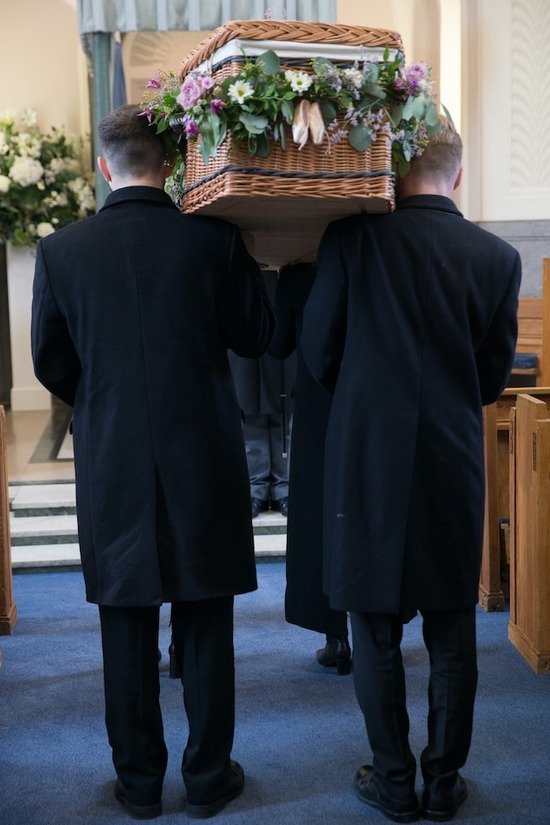The thought of dying can seem scary. And the idea of being resurrected—or coming back to life—can seem a little uncomfortable.
But thankfully, these topics don’t have to be scary or uncomfortable. Understanding them from a biblical perspective can help take away the feeling of the unknown.
Seventh-day Adventists believe that death is like a sleep until Jesus Christ returns. At that time, those who died in Christ will be resurrected, or brought back to life. These righteous ones will go live with Jesus in heaven. Later, the unrighteous, those who rejected Christ, will also be resurrected and receive the consequences of their actions.
In this article, we’ll explore these Adventist beliefs in greater depth, helping you come away with hope. We’ll get into:
First, let’s take a look at what the Seventh-day Adventist Church says about this topic in its official fundamental beliefs:
“The wages of sin is death. But God, who alone is immortal, will grant eternal life to His redeemed. Until that day death is an unconscious state for all people. When Christ, who is our life, appears, the resurrected righteous and the living righteous will be glorified and caught up to meet their Lord. The second resurrection, the resurrection of the unrighteous, will take place a thousand years later.”
Ready for some more detail from the Bible?
To understand the resurrection—coming back from the dead—we first need to understand what death is. We’ll begin there.
What happens when you die

Photo by The Good Funeral Guide on Unsplash
Adventists believe that when someone dies, their breath of life returns to God and they “sleep” unconsciously in the grave (Psalm 146:4), awaiting the resurrection. We call it “soul sleep” (John 11:11–14).
Here’s what Jesus told the Jews about the state of the dead:
“Do not marvel at this; for the hour is coming in which all who are in the graves will hear His voice and come forth—those who have done good, to the resurrection of life, and those who have done evil, to the resurrection of condemnation” (John 5:28–29, NKJV).
Jesus describes the dead as staying in their graves, awaiting resurrection—either to life or to condemnation.
The prophet Daniel also supports this:
“And many of those who sleep in the dust of the earth shall awake, some to everlasting life, some to shame and everlasting contempt” (Daniel 12:2, NKJV).
This verse shows that our destinies do not begin the moment we die, but at the resurrection.
The Bible uses many terms to describe the dead resting in the grave. It says the dead know nothing (Ecclesiastes 9:5), all their plans die with them (Psalm 146:4), and they can’t praise God (Psalm 115:17).
All of these descriptions point to the state of unconsciousness in the grave. The dead aren’t aware of anything. They can’t think, move, love, hate, or even worship God. This is how they stay till the second coming of Christ.
This state of unconsciousness is like sleeping. When we sleep, we don’t know anything till we wake up. And when we fall asleep, it feels like just a moment before we wake up again, even if it’s been eight hours.
If death is indeed this state of unconsciousness, what happens to the soul during this time?
What do Adventists teach about the immortal soul?
Adventists believe that the human soul is a combination of the breath of life from God and the body, just as we see in the Creation description (Genesis 2:7). When a person dies, this breath of life returns to God, and the body remains in the grave, meaning it loses the ability to live. It is not immortal.
Only God, according to Scripture, is immortal:
“The King of kings and Lord of lords, who alone has immortality, dwelling in unapproachable light, whom no man has seen or can see, to whom be honor and everlasting power. Amen” (1 Timothy 6:16, NKJV).
And the Bible shows in other places that the soul will indeed die with the body. Ezekiel says that “the soul who sins shall die” (Ezekiel 18:20, NKJV).
The words “soul” or “spirit” are mentioned in the Bible over 1,600 times, but none in relation to the words “immortal” or “immortality.”1
Eternal life is promised to only those who accept Jesus Christ (1 John 5:11–12). We will receive that immortality once Jesus returns and gives us new bodies (1 Corinthians 15:53–55).
Are there any people in the Bible who didn’t die?
There are a few exceptions in the Bible of people who didn’t die or didn’t remain in the grave when they died.
One of those people was Elijah, an Old Testament prophet. He appeared to Jesus before Jesus was crucified (Luke 9:28–36), though he had lived hundreds of years earlier.
This was because God took him to heaven in a chariot of fire while he was still alive (2 Kings 2).
Another example is Moses. Moses did die on the way to Canaan (Deuteronomy 34), but he didn’t remain in the grave for long. The New Testament implies that he was resurrected. Jude 9 describes a battle between Satan and Michael, the archangel, over Moses’ body. And in Luke 9, Moses was with Elijah when he appeared to Jesus.
All of this suggests that Moses didn’t go to heaven directly upon death but was instead resurrected—as a promise of the greater future resurrection of God’s people.
But before we get into the resurrection, let’s address one more question you might have.
What do Adventists believe about communicating with the dead?

Photo by cottonbro studio
Speaking to the dead is something the Bible gives very clear guidance on. In the Old Testament, God instructed the Israelites:
“There shall not be found among you anyone who makes his son or his daughter pass through the fire, or one who practices witchcraft, or a soothsayer, or one who interprets omens, or a sorcerer, or one who conjures spells, or a medium, or a spiritist, or one who calls up the dead. For all who do these things are an abomination to the Lord” (Deuteronomy 18:10–12, NKJV).
He gave similar instructions in Leviticus 19:31 and 20:27.
The thought of speaking with our deceased loved ones might seem comforting or encouraging when we miss them so much. Why, then, would God forbid it?
God warns us against these things because He doesn’t want us to be deceived or hurt. Because the dead are in a state of unconsciousness (Ecclesiastes 9:5–6), it’s impossible for them to speak with or see us.
And that means someone else must be impersonating those individuals.
Peter warns us to “be sober, be vigilant; because your adversary the devil walks about like a roaring lion, seeking whom he may devour” (1 Peter 5:8, NKJV).
Revelation also warns us about “the spirits of demons, performing signs” (Revelation 16:14, NKJV).
Though it looks like we’re speaking with dead relatives, these “talking dead people” are deceptions—they are not our relatives.
These deceptions are another part of the Great Controversy—the battle between good and evil happening at this very minute. The devil tries any way possible to deceive us, including through this type of sorcery.
God’s warnings are simply meant to protect us from what will harm us in the long run.
Now that we have a biblical perspective on death, let’s turn to a more hopeful topic—the resurrection.
What happens at the resurrection
Resurrection, in a general sense, is coming back to life. The big one Revelation talks about happens at the end of time when Jesus Christ returns to the earth.
There are two resurrections (John 5:28–29):
- The resurrection of life
- The resurrection of condemnation
The resurrection of life
The resurrection of the righteous—of life—happens at Jesus’ second coming at the end of time. The Bible calls it the first resurrection (Revelation 20:5), and it is made up of all the people who believed in God but died before He returned. They are raised to life and go to heaven with Jesus.
Here’s what the apostle Paul says about it:
“For the Lord Himself will descend from heaven with a shout, with the voice of an archangel, and with the trumpet of God. And the dead in Christ will rise first. Then we who are alive and remain shall be caught up together with them in the clouds to meet the Lord in the air. And thus we shall always be with the Lord” (1 Thessalonians 4: 16–17, NKJV).
This verse signifies our victory over the curse of sin afflicting every human being after Satan deceived Adam and Eve at the dawn of time. Jesus defeated sin when He died for us on the cross, but this event marks the end of it for God’s people.
We will get new bodies, free from disease, aches, and pains. These new bodies are immortal—they’ll never die again (1 Corinthians 15:53–55).
In heaven, the righteous will live forever, as promised to us in Romans 6:23:
“For the wages of sin is death, but the gift of God is eternal life in Christ Jesus our Lord” (NKJV).
The Second Coming also fulfills another promise Jesus made to us when He said He was preparing mansions in heaven for His followers (John 14:1–3).
But what happens to the unrighteous—the wicked? Do they get resurrected, too? Yes, they do. That’s what the second resurrection is for.
The resurrection of condemnation
This is the resurrection of all the wicked who ever lived, and it happens at the end of the 1,000 years.
What is the 1,000 years? Well, this is the time the righteous will have lived in heaven with Jesus after the first resurrection:
“But the rest of the dead did not live again until the thousand years were finished” (Revelation 20:5, NKJV).
When Jesus returns at the Second Coming, the living wicked are destroyed by the brightness of His coming (2 Thessalonians 1:7–8; 2:8; Revelation 19:21).
At the end of those 1,000 years, Jesus and the righteous will descend from heaven to earth in the heavenly city, called the New Jerusalem (Revelation 21:2).
At this time, all the dead unrighteous will come to life. They’ll include all the unrighteous from throughout history.
Revelation 20 describes how Satan, who has been imprisoned on the destitute earth, will lead them toward the city, bent on destroying God and His people. But this will be the outcome of trying to fight against God:
“They went up on the breadth of the earth and surrounded the camp of the saints and the beloved city. And fire came down from God out of heaven and devoured them. The devil, who deceived them, was cast into the lake of fire and brimstone where the beast and the false prophet are. And they will be tormented day and night forever and ever” (Revelation 20:9–10, NKJV).
These people are judged according to their deeds and then thrown into the lake of fire, or hell. The Bible calls this the “second death” (Revelation 20:14; 21:8), and it leads to their total and eternal destruction.
“These shall be punished with everlasting destruction from the presence of the Lord and from the glory of His power” (2 Thessalonians 1:9, NKJV).
Now, notice that their destruction is “everlasting.”
That means they are destroyed—annihilated—forever. This is where we get the term annihilationism. They will be dead forever.
But it doesn’t mean that the process of destroying them—the burning—will last forever. After all, a fire will naturally burn itself out unless it’s continually fed.
Thus, it’s the destruction these fires bring that will last forever. None of the people burned will ever return:
“For yet a little while and the wicked shall be no more; indeed, you will look carefully for his place, but it shall be no more” (Psalm 37:10, NKJV).
The second resurrection makes it possible for God to judge those who died refusing the gift of eternal life. Though God longs for all to be saved (Ezekiel 18:31–32), He gives each individual free choice and respects when they choose against Him.
But because God also wants to provide a world free from sin for His followers, He must destroy all sin and sinners, including Satan and his angels.
Why the resurrection is so meaningful

Photo by Pisit Heng on Unsplash
There are two reasons why the end-time resurrection is so significant:
- The resurrection at the end times is closely connected to the resurrection of Christ. Because Jesus took our penalty for sin, He’s made it possible for us to be raised to life someday, just as God raised Him from the dead.
- Without the resurrection, everyone who died in Christ is gone forever.
Let’s dig into these two ideas a bit.
In 1 Corinthians 15, we find the connection between the end-times resurrection and Christ’s. Paul says,
“For if the dead do not rise, then Christ is not risen. And if Christ is not risen, your faith is futile; you are still in your sins!” (1 Corinthians 15:13–14, NKJV).
One of our fundamental beliefs as Christians is that Christ rose from the dead on the third day. This belief gives us the hope of the resurrection and eternal life.
And it goes along with the second idea. If the resurrection at the end of time isn’t going to happen, everyone who died believing in Jesus has perished.
What exactly does “perish” mean?
The Greek word for “perish,” apolonto, means, “ruined, lost, perished, destroyed.”
This Greek word is also used in John 3:16, “that whoever believes in Him should not perish [apolonto] but have everlasting life” (NKJV).
John 3:16 isn’t merely talking about the death we experience at the end of our lives. It contrasts everlasting life with everlasting non-existence (death). Those who have rejected God will experience this non-existence after the second resurrection, but God’s people will receive what they have been hoping and longing for—eternity with God.
That gives us something to hold onto today.
Why the biblical teachings of death and the resurrection matter to us today
Death is never easy to cope with—and the Bible recognizes this and acknowledges the grief of losing those we love. But understanding death and the resurrection that comes after gives us hope. Even if we die, our faith in Jesus assures us that there is hope beyond the grave.
This thought takes away the fear of death. Jesus reassures us that:
“I am the resurrection and the life. He who believes in Me, though he may die, he shall live. And whoever lives and believes in Me shall never die” (John 11:25–26, NKJV).
When we give ourselves to Him, there’s nothing He wants more than to look out for us and make sure we have eternal life.
But receiving eternal life depends on the choices we make now. As much as God loves us, He also respects our freedom of choice. By telling us about death and the resurrection in Scripture, He helps us understand our options, leading us to choose our destiny.
He does this so that we can be prepared and be part of the resurrection of life.
By making that decision for Him, we receive assurance for the future.
Jesus made a promise that He’ll come for us. And He will keep that promise.
If you’d like to learn more, check out our Bible studies on death.
Choose an Online Bible Study
Want to keep learning? Find out more about Jesus, humanity, the plan of salvation, and how God loves you enough to sacrifice everything, just to give you a chance to choose Him.
Sometimes it can be hard to know where to start, that’s why we offer free, user-friendly, online Bible study options you can do anytime, anywhere, and at your own pace.
This online Bible school will take you through the major themes of Scripture, breaking down the Bible’s complex concepts into bite-sized pieces, which can lead you toward the answers of life’s more challenging questions.
- “Immortality,” SDA Bible Encyclopedia, rev. ed., p. 621. [↵]
More Answers
What Adventists Believe about The Experience of Salvation?
The Seventh-day Adventist Church believes that salvation is a gift that anyone can receive through faith in Jesus Christ, the Son of God. When we accept His sacrificial death in our place, He saves us from the penalty and power of sin (or evil), which prevents us from experiencing true freedom.
What do Seventh-day Adventists Believe about the Life, Death, and Resurrection of Jesus?
Jesus Christ, a person who lived in first-century Palestine, is the foundation of the Adventist faith. This is because it’s only through the life, death, and resurrection of Jesus that any of us have hope of life beyond the toil, suffering, and death of this world.
What do Seventh-day Adventists Believe about The Great Controversy?
The “Great Controversy” is the phrase Seventh-day Adventists typically use to describe the cosmic spiritual conflict between the forces of good (God) and the forces of evil or sin (Satan/the devil).
What do Seventh-day Adventists Believe about Creation?
Seventh-day Adventists believe that God is the creator of our world. They come to this conclusion from the first book of the Bible—Genesis. The account there tells us that God took six literal days to form the earth and all it contains, including us humans.
What Do Seventh-day Adventists Believe about the Father?
Like most Protestant Christians, Seventh-day Adventists believe in God the Father as part of the Godhead. We call Him Father because of His role towards Jesus. Jesus Himself encouraged us to also call Him Father.
What do Seventh-day Adventists Believe about Sin and the Nature of Humanity?
Seventh-day Adventists believe that humanity was created perfect and that, at our very core, we crave this kind of perfection and unity with God. But unfortunately, the Bible teaches that we chose to be wise in our own eyes and disobey God, which led to a natural tendency to be sinful, evil, and selfish.
What Do Seventh-Day Adventists Believe about God the Holy Spirit?
Besides believing in the full divinity of God the Father and God the Son, Adventists also believe in the full divinity of God the Holy Spirit. This post will go over what the Bible says about the Holy Spirit. You’ll learn:
What Do Seventh-day Adventists Believe about God the Son?
Seventh-day Adventists believe that Jesus is fully God, being one of the members of the Trinity. And that He plays a central role in it as the Son of God.
What Seventh-day Adventists Believe about the Trinity
How can Father, Son, and Holy Spirit all be one God? Find out as you learn what the Bible has to say about the Trinity.
What Seventh-day Adventists Believe about the Bible
The Bible forms the foundation for all that Seventh-day Adventists believe and teach. It reveals God to us and is our final authority on all issues relating to morals, doctrine, salvation, and the very nature and purpose of life itself (Isaiah 8:20).
Didn’t find your answer? Ask us!
We understand your concern of having questions but not knowing who to ask—we’ve felt it ourselves. When you’re ready to learn more about Adventists, send us a question! We know a thing or two about Adventists.










